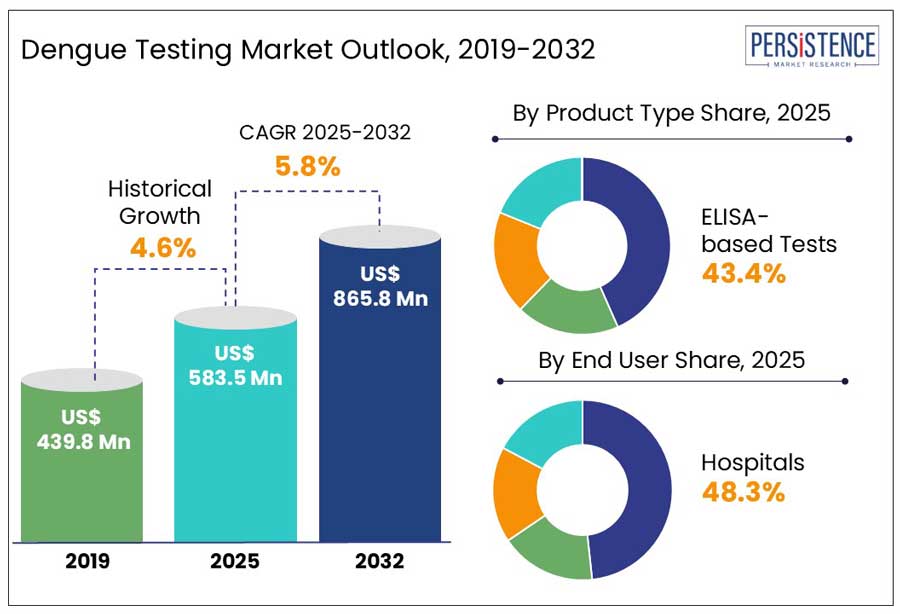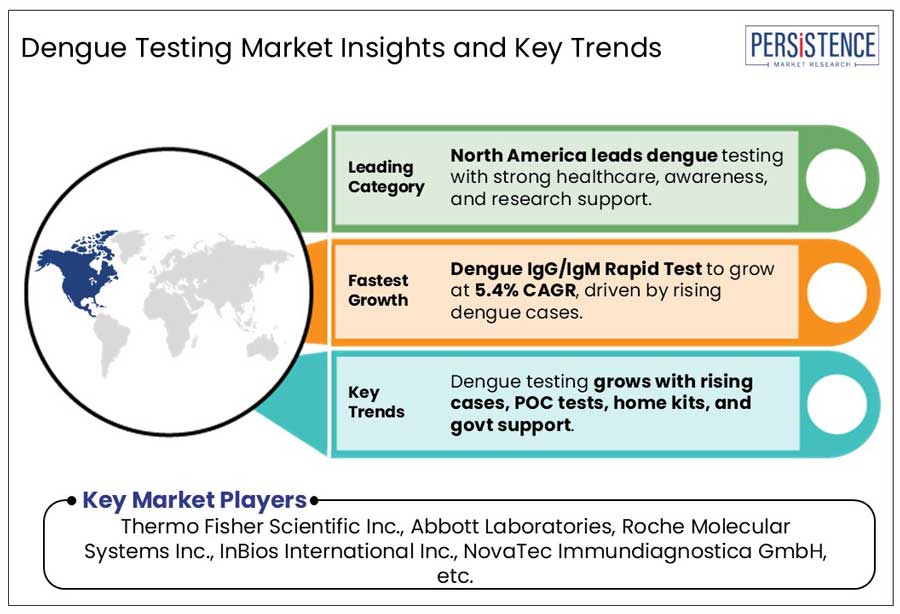ID: PMRREP22738| 240 Pages | 7 Apr 2025 | Format: PDF, Excel, PPT* | Healthcare

The global dengue testing market is anticipated to reach a value of US$583.5 billion in 2025 and witness a CAGR of 5.8% from 2025 to 2032. The market will likely attain a value of US$865.8 billion by 2032.
According to Persistence Market Research, the global rise in dengue cases is expected to drive the growth. Increasing awareness, government initiatives to control disease, and advancements in diagnostic technology contribute to the expansion initiatives. The demand for quick and precise diagnosis, along with high infection rates in developing countries, serve as key growth drivers. However, challenges such as limited healthcare infrastructure in certain areas restrict market growth. Despite these obstacles, the need for effective dengue diagnostic methods is likely to propel further advancements.

Key Industry Highlights
|
Global Market Attribute |
Key Insights |
|
Market Size (2025E) |
US$ 583.5 Mn |
|
Market Value Forecast (2032F) |
US$ 865.8 Mn |
|
Projected Growth (CAGR 2025 to 2032) |
5.8% |
|
Historical Market Growth (CAGR 2019 to 2024) |
4.6% |
Driver - Increasing Incidences of Dengue in the Population Drives the Need for Vaccines
The dengue testing market is witnessing significant growth, driven by the rising incidence of dengue fever worldwide. The World Health Organization (WHO) reports a sharp increase in cases, particularly in tropical and subtropical regions, including Asia, Latin America, and Africa. Factors such as urbanization, climate change, and inadequate mosquito control measures have contributed to the rapid spread of the virus.
With millions of cases reported annually, the demand for accurate and rapid diagnostic solutions has surged. Healthcare facilities and governments are increasingly adopting advanced testing methods, including molecular diagnostics, serological assays, and rapid antigen tests, to facilitate early detection and effective disease management. Additionally, point-of-care and home-based testing kits are gaining traction due to their convenience and quick results. As dengue outbreaks become more frequent and severe, the expansion of diagnostic technologies and increased healthcare investments are expected to drive sustained growth in the global market.
Restraint - Challenges in Diagnosing Severe Dengue Limit Market Efficiency
One of the main challenges in the dengue testing market is the difficulty to identify severity levels in several patients. In the current scenario, tests such as the NS1 antigen and IgM/IgG antibody affirm infection levels but are unreliable to predict the intensity and outcome. As a countermeasure, doctors often recommend hospital admission for patients during dengue outbreaks which eventually outruns the hospital bed capacity. Regular blood tests, such as checking haematocrit levels are used in tracking severe symptoms, which can be time-consuming and costly. Additionally, disease such as Leptospirosis and Chikungunya with similar symptoms makes the diagnosis harder.
Opportunity – Rising Global Dengue Burden Creates Opportunities for Diagnostic Innovation
The increasing global burden of dengue presents strong opportunities for diagnostic innovations. Researchers are actively focusing on creating affordable, portable, and accurate tools for early detection. Key areas include developing serological tests that differentiate between dengue and other flaviviruses, simplified genomic testing protocols, and tools for prognosis.
Improving specimen handling and transportation methods enhance diagnostic reach in remote areas. Additionally, the production and availability of standardized reagents and recombinant antigens offer major potential to improve test accuracy and consistency. These advancements, supported by global health initiatives will significantly improve dengue diagnosis and patient management worldwide.
Product Type Insights
ELISA-based tests are the leading product type segment in the global market and are projected to hold 43.4% of the market share in 2025. These tests are highly preferred due to their accuracy in identifying dengue-specific antibodies, including IgM and IgG, which help determine the stage of infection.
Their reliability in detecting dengue virus antigens early in the infection process makes them a crucial tool for disease management. Increased demand for accurate and efficient diagnostic solutions, along with advancements in ELISA technology continues to drive the segment growth the global dengue testing market.
End-User Insights
Hospitals play a vital role in dengue testing due to their credibility. The demand for dengue diagnostics particularly grows as the rate of in-patients in clinics and hospitals rises significantly as they are the primary centers for diagnosing and managing infectious diseases. Hospitals ensure accurate and timely detection of dengue infections since they are equipped with advanced laboratory facilities and have experienced healthcare professionals. Their ability to provide immediate medical attention and treatment further strengthens their position as the preferred choice for dengue testing.
Additionally, hospitals offer a wide range of diagnostic methods, including ELISA and PCR-based tests, enhancing the accuracy of results. As comprehensive healthcare providers, they cater to a large number of patients, making them essential in disease surveillance and epidemic response. The growing reliance on hospital-based dengue testing continues to drive market growth, reinforcing their dominance in the sector and highlighting their importance in controlling dengue outbreaks effectively.

North America Dengue Testing Market Trends
The dengue testing market in North America is expanding due to the increasing incidence of travel-related dengue cases and the growing risk of local transmission in some regions. Warm temperatures and climate change have contributed to the spread of mosquito population increasing the potential for dengue outbreak. The United States and Mexico are key markets with Mexico experiencing a higher burden of cases due to its tropical climate. Advancements in diagnostic technology, including rapid antigen tests and molecular assays improve early detection and disease management. Increased healthcare awareness and government initiatives aimed at vector control and surveillance effectively support need for dengue testing.
Europe Dengue Testing Market Trends
Europe has experienced a notable rise in dengue cases, significantly impacting the demand for diagnostic testing. In 2023, imported dengue cases in the European Economic Area (EEA) surged to 4,900, up from 1,572 in 2022. Additionally, locally acquired cases increased from 71 in 2022 to 130 in 2023. The upward trend is attributed to factors such as climate change, which has expanded the habitat of dengue-carrying mosquitoes, and increased international travel. Consequently, there is a heightened need for accurate and rapid diagnostic solutions, propelling growth in the European market. Healthcare systems are investing in advanced testing technologies, including ELISA-based and molecular assays, to effectively manage and control the spread of dengue within the region.
Asia Pacific Dengue Testing Market Trends
Asia Pacific is experiencing a surge in dengue cases due to climate change, which is altering mosquito breeding patterns and disease transmission. Rising temperatures, high humidity, and increased rainfall are ideal conditions for mosquito proliferation.
According to the National Center for Vector Borne Diseases Control (NCVBDC), India, which reported nearly 300,000 dengue cases in 2023, faces severe health challenges with undiagnosed cases leading to complications. Along with Indonesia and the Philippines, the rising dengue burden is driving demand for accurate and rapid diagnostic solutions to ensure timely detection and treatment.
MEA Dengue Testing Market Trends
The Middle East and Africa (MEA) region is witnessing a growing demand for dengue testing due to rising infection rates and changing climate conditions. Countries with tropical and subtropical climates, such as the Saudi Arabia, UAE, Kenya, and Nigeria experience increased mosquito activity leading to a higher dengue burden. Limited healthcare infrastructure in some regions drives efforts to improve diagnostic capabilities with governments investing in better surveillance and early detection programs. The demand for rapid diagnostic tests, including ELISA and PCR-based solutions is increasing as healthcare providers focus on timely intervention to manage outbreaks effectively.
LATAM Dengue Testing Market Trends
The Latin American dengue testing market is growing rapidly due to the increasing number of dengue cases across the region. In 2023, over 4.2 million cases were reported, with Brazil accounting for approximately 2.9 million cases, followed by Peru and Mexico. Governments and healthcare organizations are investing in improved surveillance programs and expanding laboratory infrastructure to enhance early detection and disease management. Additionally, the rise in point-of-care testing and home-based diagnostic kits is further driving market expansion.
The dengue testing market is highly competitive, with several key players focusing on innovation, product development, and strategic partnerships. Companies such as Abbott Laboratories, Roche Molecular Systems, Thermo Fisher Scientific, and InBios International dominate the market with advanced diagnostic solutions. Increasing investments in research and development have led to the introduction of rapid diagnostic tests and PCR-based assays improves early detection. Mergers, acquisitions, and collaborations are common strategies to expand market presence. Additionally, emerging players are entering the market with cost-effective testing solutions, further intensifying competition and driving technological advancements in dengue diagnostics worldwide.
Key Industry Developments
The global market is estimated to increase from US$ 583.5 billion in 2025 to US$ 865.8 billion in 2032.
Rising dengue cases, climate change, urbanization, and demand for rapid diagnostics are driving the growth of the dengue testing market.
The market is projected to record a CAGR of 5.8% during the forecast period from 2025 to 2032.
Thermo Fisher Scientific Inc., Abbott Laboratories, Roche Molecular Systems Inc., InBios International Inc., NovaTec Immundiagnostica GmbH, and Others.
Expanding healthcare infrastructure, technological advancements in diagnostics, government initiatives, and increasing adoption of home-based and point-of-care testing solutions create opportunities.
|
Report Attribute |
Details |
|
Historical Data/Actuals |
2019 - 2024 |
|
Forecast Period |
2025 - 2032 |
|
Market Analysis Units |
Value: US$ Mn, Volume: As applicable |
|
Geographical Coverage |
|
|
Segmental Coverage |
|
|
Competitive Analysis |
|
|
Report Highlights |
|
|
Customization and Pricing |
Available upon request |
By Product Type
By End-User
By Region
Delivery Timelines
For more information on this report and its delivery timelines please get in touch with our sales team.
About Author